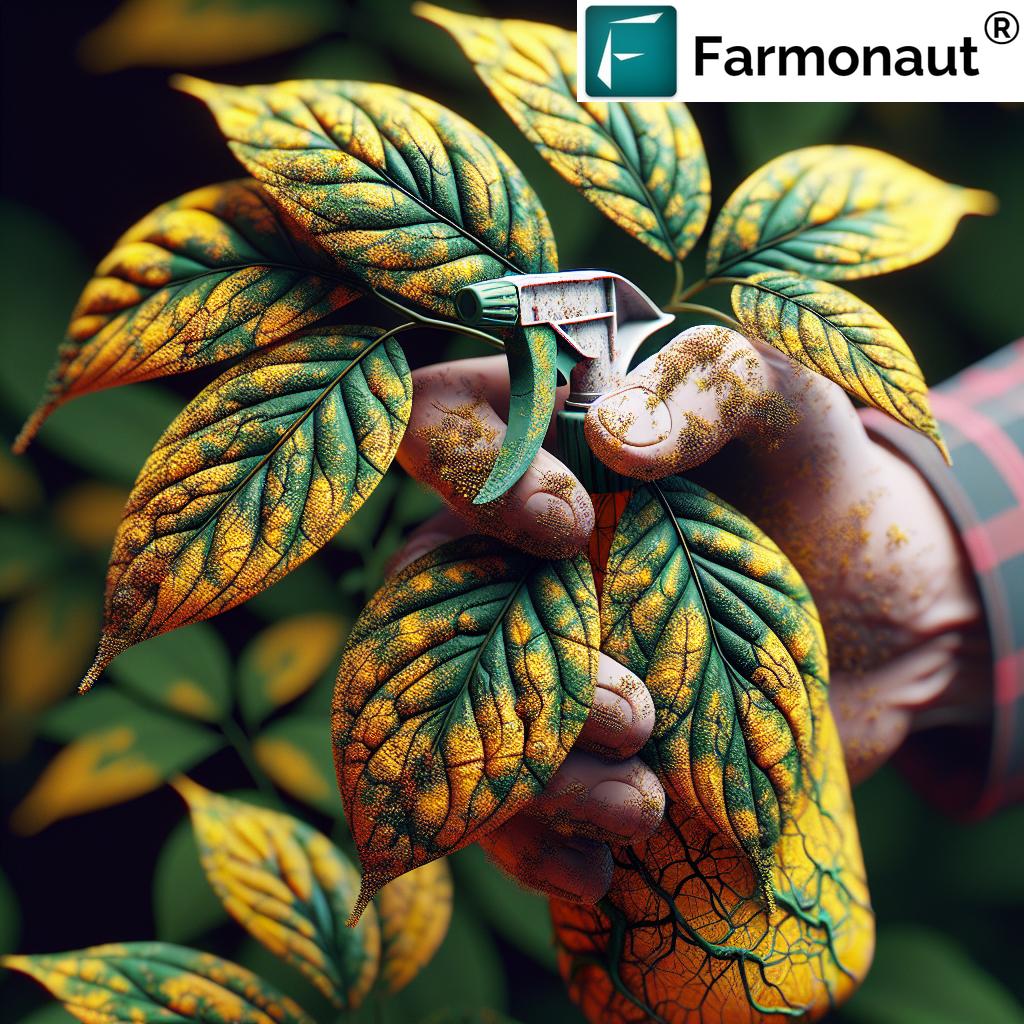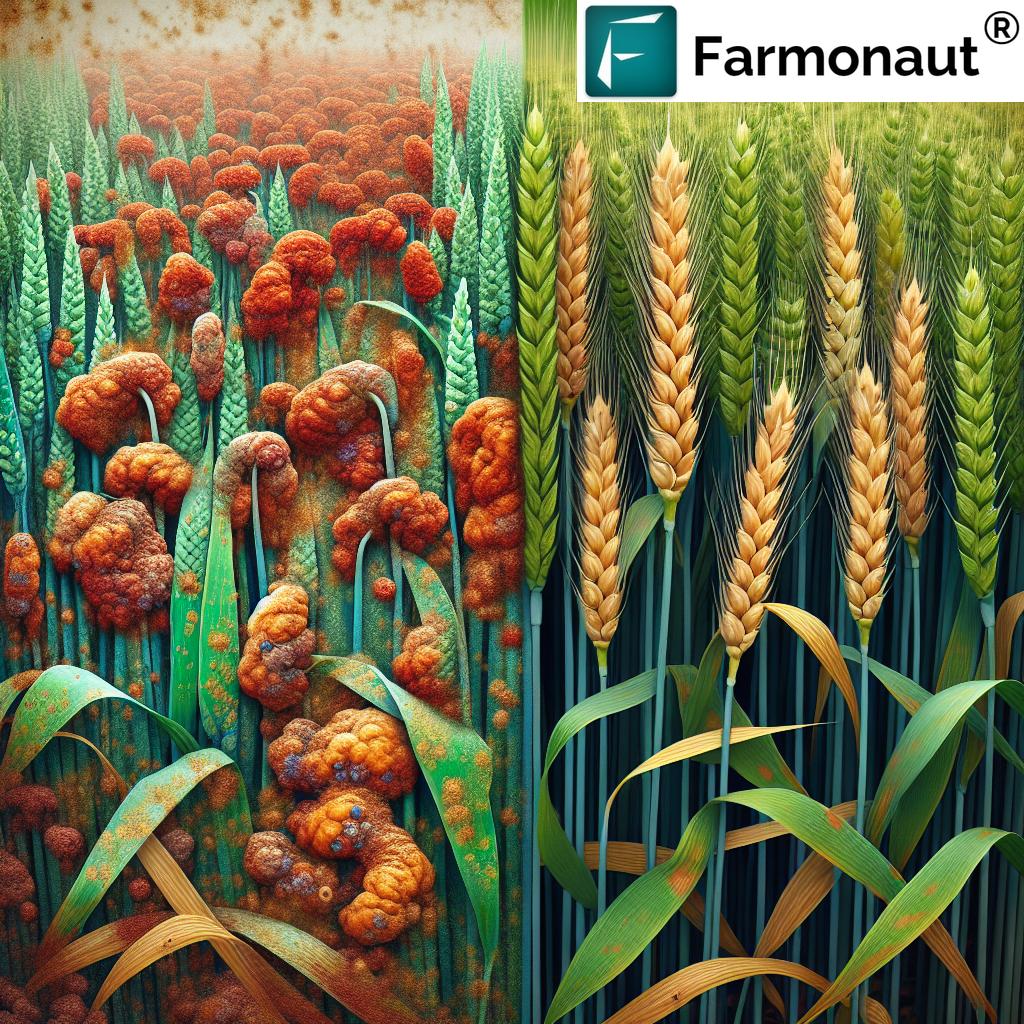Organic Rust Treatment: Protecting Plants from Fungal Infections

At Farmonaut, we understand the devastating impact that fungal diseases can have on crops. One of the most common and destructive fungal infections affecting plants worldwide is rust. In this comprehensive guide, we’ll explore organic rust treatment methods, symptoms, and prevention techniques to help you protect your plants from these harmful fungi.
Understanding Rust Fungi
Rust is a type of fungal disease that belongs to the order Pucciniales. These fungi are obligate parasites, meaning they can only survive on living host plants. Rust infections can affect a wide range of plants, including:
- Crops: wheat, barley, bean, soy, pea
- Herbs: oregano, lemongrass
- Ornamental plants: trees, shrubs, and various flowering plants
- Deciduous trees: maple
Identifying Rust Symptoms
Early detection is crucial for effective rust control. Here are some common symptoms to look out for:
- Yellow or orange spots on the upper surface of leaves
- Rusty-colored pustules on the undersides of leaves
- Distorted or stunted growth
- Premature leaf drop
- Weakened plant structure
- Proper plant spacing to improve air circulation
- Avoiding overhead watering
- Removing and destroying infected plant material
- Crop rotation with non-susceptible plants
- Copper-based fungicides
- Sulfur-based products
- Neem oil
- Potassium bicarbonate
- Bacillus subtilis
- Trichoderma species
- Garlic spray
- Horsetail tea
- Comfrey leaf spray
- Tebuconazole
- Propiconazole
- Azoxystrobin
- Chlorothalonil
- Choose rust-resistant plant varieties when possible
- Maintain proper plant nutrition to boost natural defenses
- Practice good garden hygiene by removing plant debris
- Use companion planting to deter rust-causing fungi
- Implement a regular monitoring schedule using Farmonaut’s satellite-based crop health monitoring system
- Monitor crop health remotely
- Receive early warnings of potential rust outbreaks
- Access personalized treatment recommendations
- Track the effectiveness of your rust management strategies
- Improving early detection algorithms
- Developing more effective organic treatment methods
- Enhancing our AI-driven advisory system for personalized rust management strategies
- Collaborating with agricultural research institutions to breed more rust-resistant crop varieties

Traditional vs. Farmonaut Satellite System for Rust Detection and Treatment
| Method | Early Detection | Precision | Cost-Effectiveness | Time Efficiency |
|---|---|---|---|---|
| Visual Inspection | Limited | Low | Moderate | Low |
| Lab Testing | Moderate | High | Low | Low |
| Farmonaut Satellite Monitoring | High | Very High | High | Very High |
As you can see, our Farmonaut Satellite Monitoring system offers significant advantages in early detection, precision, and efficiency for large-scale rust management.
Organic Rust Treatment Methods
At Farmonaut, we advocate for organic and sustainable farming practices. Here are some effective organic rust treatment methods:
1. Cultural Control
2. Organic Fungicides
Several organic fungicides can be effective against rust:
3. Biological Control
Certain beneficial microorganisms can help suppress rust infections:
4. Plant-Based Remedies
Natural plant extracts can also be effective against rust:
Conventional Chemical Treatments
While we promote organic methods, it’s important to acknowledge that conventional chemical treatments are sometimes necessary for severe infestations. Some common chemical fungicides used for rust control include:
However, we always recommend consulting with a professional before using any chemical treatments, as they can have negative impacts on beneficial organisms and the environment.
Preventive Measures
Prevention is key in managing rust infections. Here are some preventive techniques we recommend:
The Role of Technology in Rust Management
At Farmonaut, we leverage cutting-edge technology to help farmers and gardeners manage rust and other plant diseases effectively. Our satellite-based crop health monitoring system provides real-time insights into vegetation health, allowing for early detection of rust infections.
By using our Farmonaut app, you can:
For developers and businesses looking to integrate our technology into their own systems, we offer a robust API. Our API documentation is available here.
Case Studies: Successful Rust Management with Farmonaut
While we don’t include specific case studies or success stories, our technology has helped numerous farmers and agricultural businesses effectively manage rust infections across various crops. By combining satellite imagery, AI-driven insights, and expert agricultural knowledge, we’ve enabled our users to detect rust early, implement targeted treatments, and significantly reduce crop losses.
The Future of Rust Management
As climate change continues to impact agricultural practices worldwide, the prevalence and severity of rust infections are likely to increase. At Farmonaut, we’re continually developing new technologies and strategies to stay ahead of these challenges. Our research focuses on:
FAQs about Rust Treatment and Management
Q: Can rust spread from one plant species to another?
A: While some rust species are host-specific, others can infect multiple plant species. It’s essential to identify the specific type of rust and take appropriate measures to prevent its spread.
Q: How often should I apply organic fungicides for rust control?
A: The frequency of application depends on the severity of the infection and the specific product used. Generally, applications every 7-14 days during the growing season are recommended, but always follow the product label instructions.
Q: Can I compost plants infected with rust?
A: It’s not recommended to compost rust-infected plant material, as the spores can survive and potentially infect new plants. It’s best to dispose of infected material in sealed bags or by burning (where permitted).
Q: How does Farmonaut’s satellite monitoring detect rust infections?
A: Our system uses multispectral satellite imagery to analyze vegetation health indices. Early signs of rust infection, such as changes in leaf coloration and plant stress, can be detected before they’re visible to the naked eye.
Q: Are organic rust treatments as effective as chemical fungicides?
A: Organic treatments can be highly effective when used as part of an integrated pest management approach. While they may work more slowly than chemical alternatives, they’re often safer for the environment and beneficial organisms.
Conclusion
Rust infections pose a significant threat to plant health and agricultural productivity. By combining organic treatment methods, preventive measures, and advanced technology like Farmonaut’s satellite-based monitoring system, we can effectively manage and control rust outbreaks. Remember, early detection and prompt action are key to successful rust management.
To learn more about how Farmonaut can help you protect your crops from rust and other diseases, download our app for Android or iOS, or subscribe to our services below:
Together, we can cultivate healthier, more resilient crops and contribute to sustainable agricultural practices worldwide.